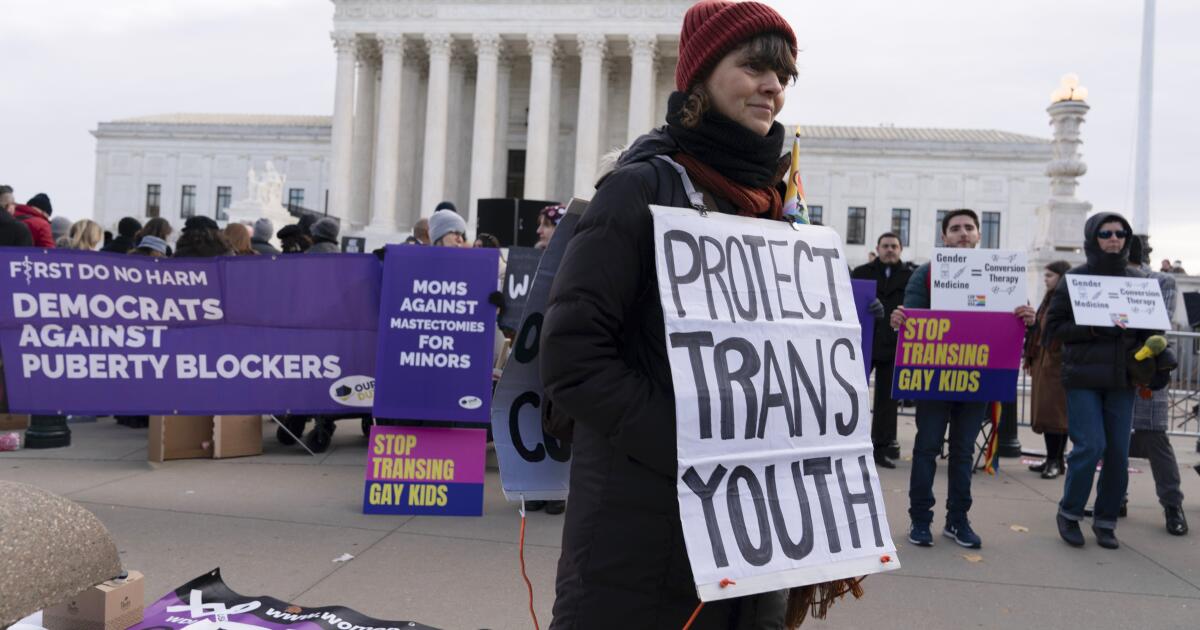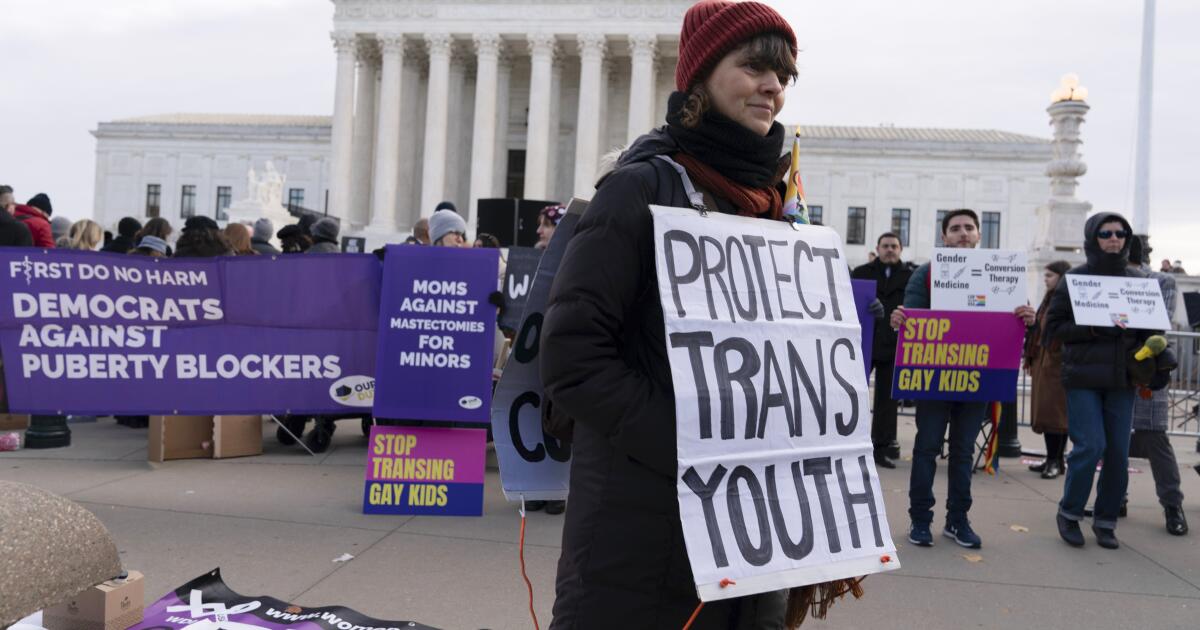
WASHINGTON — The Supreme Court ruled Wednesday that states may ban puberty blockers and hormone treatments for transgender teens, rejecting the claim that such gender-based discrimination is unconstitutional.
In a 6-3 decision, the court’s conservative majority said states are generally free to decide on proper standards of medical care.
Chief Justice John G. Roberts Jr. said there is “an ongoing debate among medical experts regarding the risks and benefits” of hormone treatments for adolescents with gender dysphoria.
In dissent, Justice Sonia Sotomayor said the law at issue “plainly discriminates on the basis of sex. … By retreating from meaningful judicial review exactly where it matters most, the Court abandons transgender children and their families to political whims.” Justices Elena Kagan and Ketanji Brown Jackson agreed.
Wednesday’s decision highlights the nation’s sharp right turn in the last year on transgender rights and gender-affirming care and the divide among states.
The ruling upholds laws in Tennessee and 23 other Republican-led states, all of them adopted in the last four years. Tennessee lawmakers said the number of minors being diagnosed with gender dysphoria had “exploded” in recent years, leading to a “surge in unproven and risky medical interventions for these underage patients.”
California and other Democratic-led states do not prohibit doctors from prescribing puberty blockers or hormones for those under age 18 who are diagnosed with gender dysphoria. Some, including California, have explicit protections for such care, which the high court’s ruling does not undo.
However, there are other threats to gender-affirming care in liberal states. The Trump administration has sought to prevent the use of federal funds to pay for such care, and Republicans in Congress are attempting to bar or rein in such care — for adults and children alike — under Medicaid.
In recent years, surveys have found that most large private employers and their insurers provide coverage for gender-affirming care. And in California and most Democratic states, it is illegal to discriminate in healthcare against patients based on their gender identity and transgender status.
But President Trump’s threats have already prompted some government-funded providers to pull back.
For example, The Times reported last week that Children’s Hospital Los Angeles will shutter its long-standing healthcare program for transgender children and young adults this summer, according to emails.
The Center for Transyouth Health and Development began informing its nearly 3,000 patient families last week that there was “no viable alternative” to shuttering.
Hospital officials in an email said continuing to provide the care would jeopardize the hospital’s ability to care for all its other patients, given the threats to crucial federal funding and doctors providing such care.
The announcement left many families confused and scared, unsure of their next steps. The hospital’s Transyouth center is among the only facilities that provides puberty blockers, hormones and surgical procedures for trans youth on public insurance.
Caleb Smith, director of LGBTQI+ policy at the liberal Center for American Progress, said the Supreme Court’s decision does not tell insurance companies that they can ignore state law and decide for themselves to not provide such coverage. But it “does potentially pave a path for additional cases and additional legislation” that could further erode such coverage, Smith said.
Meanwhile, if Republicans succeed in restricting Medicaid and Affordable Care Act coverage for such care, LGBTQ+ people would lose healthcare nationwide, Smith said.
The case decided by the Supreme Court on Wednesday began with an appeal from Biden administration Solicitor Gen. Elizabeth Prelogar, who urged the justices to hear the Tennessee case and strike down the wave of red-state laws that targeted medical treatment for transgender teens.
Prelogar spoke of a broad consensus — including among American medical associations — in favor of gender-affirming care. It was unconstitutional, she argued, for states to ban “evidence-based treatments supported by the overwhelming consensus of the medical community.”
But Republican lawmakers voiced doubt about the long-term effect of hormone treatments for adolescents. They cited last year’s Cass Report from Britain, which concluded there were not long-term studies or reliable evidence in support of the treatments.
The court’s six conservatives, all Republican appointees, said they were not prepared to “second guess” the states that had banned hormone treatments for minors.
But Tennessee Atty. Gen. Jonathan Skrmetti said “the common sense of Tennessee’s voters prevailed over judicial activism.”
Trans-rights advocates argued the court should have deferred to parents and doctors, not state lawmakers.
“When the political system breaks down and legislatures bow to popular hostility, the judiciary must be the Constitution’s backbone,” said Jennifer Levi, GLAD Law senior director of transgender and queer rights. “Instead, it chose to look away, abandoning both vulnerable children and the parents who love them.”
Lawyers for Lambda Legal and the ACLU called it “a heartbreaking ruling, making it more difficult for transgender youth to escape the danger and trauma of being denied their ability to live and thrive.”
LGBTQ+ advocates were prepared for a loss in the Tennessee case. The court’s conservatives signaled during an oral argument in December they were likely uphold the red-state laws.
But in the wake of the ruling, some feared the outcome would reach even further, including by diminishing the resolve of liberal states to continue defending such care against Trump administration threats.
Within days of taking office, Trump issued an executive order accusing medical professionals providing gender-affirming care of “maiming and sterilizing” children. The order said that the federal government would no longer “fund, sponsor, promote, assist, or support” such care, and that it would “rigorously enforce all laws that prohibit or limit these destructive and life-altering procedures.”
In May, the Department of Health and Human Services issued new guidance recommending behavioral therapy rather than gender-affirming care for children with gender dysphoria. The guidance was criticized by both the American Medical Assn. and the American Academy of Pediatrics, the latter of which said its policies were cited in the health department’s guidance “in inaccurate and misleading ways.”
Joe Hollendoner, chief executive of the Los Angeles LGBT Center, condemned the court’s decision Wednesday, but said it “does not change the law in states like California, where gender-affirming care remains legal and protected.”
“Now more than ever, we need our medical partners to stand with our community and not act out of fear — or worse, align with the policies of a resurgent Trump-era agenda,” Hollendoner said.



